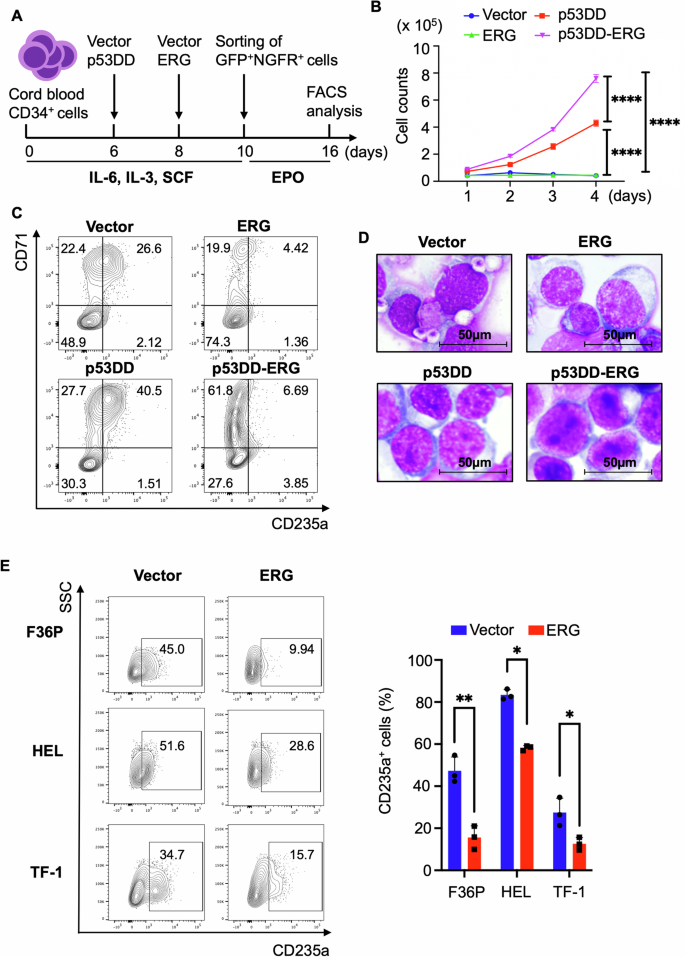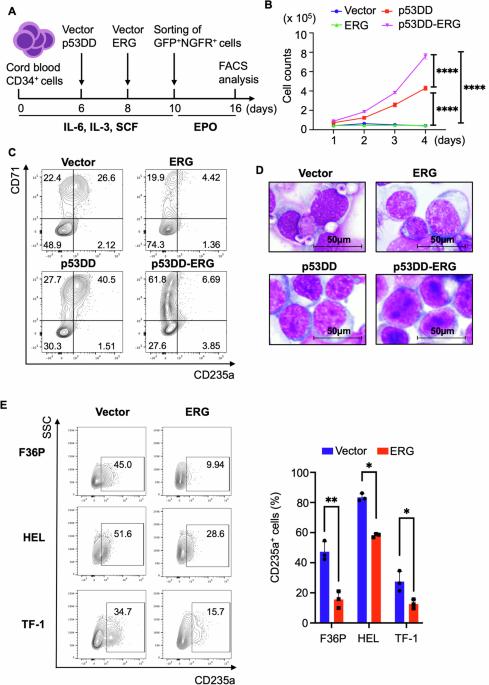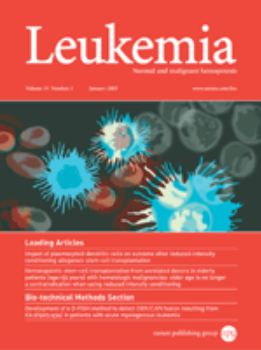HDAC7 是急性红细胞白血病的潜在治疗靶点
IF 12.8
1区 医学
Q1 HEMATOLOGY
引用次数: 0
摘要
急性红细胞白血病(AEL)是急性髓性白血病的一种罕见亚型,预后较差。在这项研究中,我们建立了一个Trp53缺失和ERG过表达的新型小鼠AEL模型。在Trp53缺失的小鼠骨髓细胞中过表达ERG,而不在野生型骨髓细胞中过表达ERG,会导致AEL在移植后两个月内发病,且具有100%的穿透性。已建立的表达Cas9的小鼠AEL细胞可在体外培养,即使在未接受辐照的受体小鼠体内也能诱导AEL,并能利用CRISPR/Cas9系统实现高效的基因消减。我们还证实了ERG过表达和TP53失活在促进人类脐带血细胞中未成熟红细胞生长方面的作用。从机理上讲,ERG 可拮抗 KLF1 并抑制红细胞的成熟,而 TP53 的缺失则可促进红细胞祖细胞的增殖。此外,通过基于 DepMap 的两组比较分析,我们发现 HDAC7 是 AEL 的特异性易感基因。HDAC7 通过其非酶功能促进人和小鼠 AEL 细胞在体外和体内的生长。我们的研究提供了实验证据,证明TP53缺乏和ERG过表达是AEL发病的必要条件和充分条件,并强调HDAC7是治疗这种疾病的一个有希望的靶点。本文章由计算机程序翻译,如有差异,请以英文原文为准。


HDAC7 is a potential therapeutic target in acute erythroid leukemia
Acute erythroleukemia (AEL) is a rare subtype of acute myeloid leukemia with a poor prognosis. In this study, we established a novel murine AEL model with Trp53 depletion and ERG overexpression. ERG overexpression in Trp53-deficient mouse bone marrow cells, but not in wild-type bone marrow cells, leads to AEL development within two months after transplantation with 100% penetrance. The established mouse AEL cells expressing Cas9 can be cultured in vitro, induce AEL in vivo even in unirradiated recipient mice, and enable efficient gene ablation using the CRISPR/Cas9 system. We also confirmed the cooperation between ERG overexpression and TP53 inactivation in promoting the growth of immature erythroid cells in human cord blood cells. Mechanistically, ERG antagonizes KLF1 and inhibits erythroid maturation, whereas TP53 deficiency promotes proliferation of erythroid progenitors. Furthermore, we identified HDAC7 as a specific susceptibility in AEL by the DepMap-based two-group comparison analysis. HDAC7 promotes the growth of human and mouse AEL cells both in vitro and in vivo through its non-enzymatic functions. Our study provides experimental evidence that TP53 deficiency and ERG overexpression are necessary and sufficient for the development of AEL and highlights HDAC7 as a promising therapeutic target for this disease.
求助全文
通过发布文献求助,成功后即可免费获取论文全文。
去求助
来源期刊

Leukemia
医学-血液学
CiteScore
18.10
自引率
3.50%
发文量
270
审稿时长
3-6 weeks
期刊介绍:
Title: Leukemia
Journal Overview:
Publishes high-quality, peer-reviewed research
Covers all aspects of research and treatment of leukemia and allied diseases
Includes studies of normal hemopoiesis due to comparative relevance
Topics of Interest:
Oncogenes
Growth factors
Stem cells
Leukemia genomics
Cell cycle
Signal transduction
Molecular targets for therapy
And more
Content Types:
Original research articles
Reviews
Letters
Correspondence
Comments elaborating on significant advances and covering topical issues
 求助内容:
求助内容: 应助结果提醒方式:
应助结果提醒方式:


